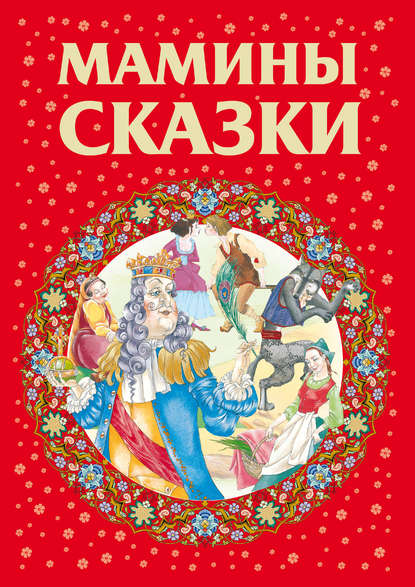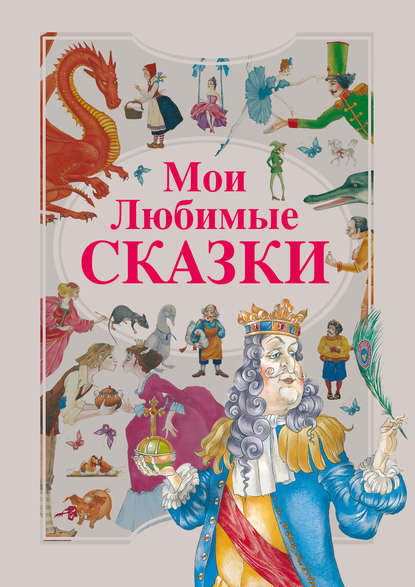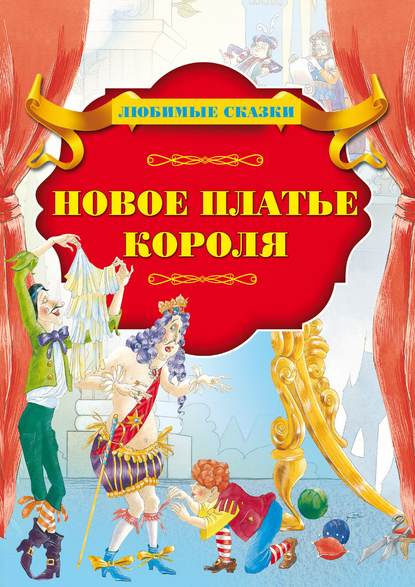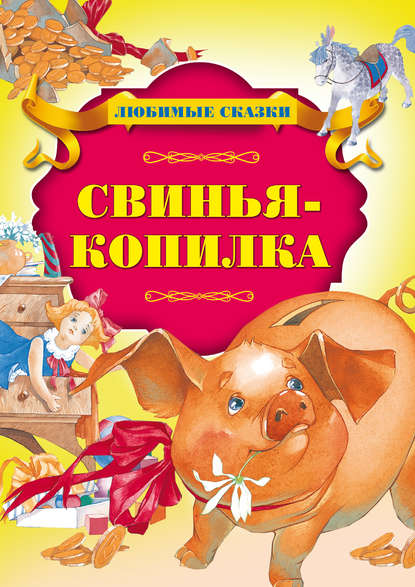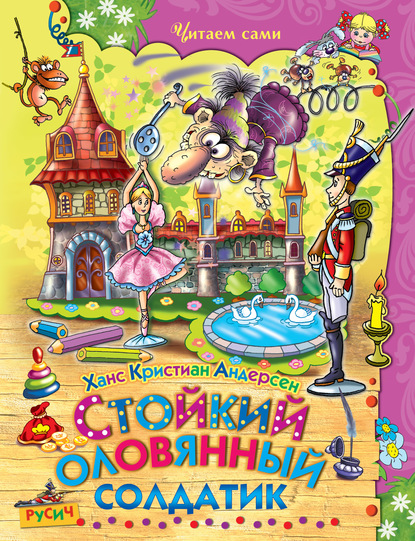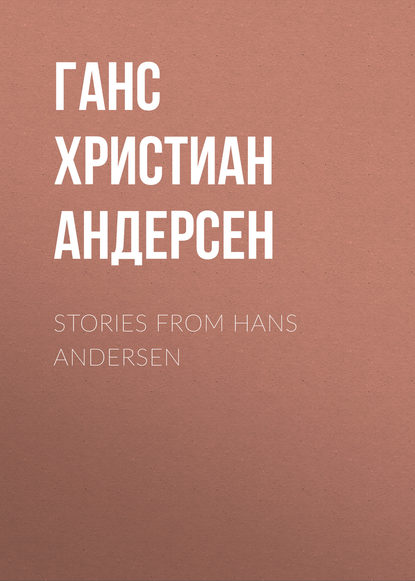 Полная версия
Полная версияПолная версия:
Ганс Христиан Андерсен Stories from Hans Andersen
- + Увеличить шрифт
- - Уменьшить шрифт

H. C. Andersen
Stories from Hans Andersen
THE SNOW QUEEN
FIRST STORY
WHICH DEALS WITH A MIRROR AND ITS FRAGMENTS
Now we are about to begin, and you must attend; and when we get to the end of the story, you will know more than you do now about a very wicked hobgoblin. He was one of the worst kind; in fact he was a real demon. One day he was in a high state of delight because he had invented a mirror with this peculiarity, that every good and pretty thing reflected in it shrank away to almost nothing. On the other hand, every bad and good-for-nothing thing stood out and looked its worst. The most beautiful landscapes reflected in it looked like boiled spinach, and the best people became hideous, or else they were upside down and had no bodies. Their faces were distorted beyond recognition, and if they had even one freckle it appeared to spread all over the nose and mouth. The demon thought this immensely amusing. If a good thought passed through any one's mind, it turned to a grin in the mirror, and this caused real delight to the demon. All the scholars in the demon's school, for he kept a school, reported that a miracle had taken place: now for the first time it had become possible to see what the world and mankind were really like. They ran about all over with the mirror, till at last there was not a country or a person which had not been seen in this distorting mirror. They even wanted to fly up to heaven with it to mock the angels; but the higher they flew, the more it grinned, so much so that they could hardly hold it, and at last it slipped out of their hands and fell to the earth, shivered into hundreds of millions and billions of bits. Even then it did more harm than ever. Some of these bits were not as big as a grain of sand, and these flew about all over the world, getting into people's eyes, and, once in, they stuck there, and distorted everything they looked at, or made them see everything that was amiss. Each tiniest grain of glass kept the same power as that possessed by the whole mirror. Some people even got a bit of the glass into their hearts, and that was terrible, for the heart became like a lump of ice. Some of the fragments were so big that they were used for window panes, but it was not advisable to look at one's friends through these panes. Other bits were made into spectacles, and it was a bad business when people put on these spectacles meaning to be just. The bad demon laughed till he split his sides; it tickled him to see the mischief he had done. But some of these fragments were still left floating about the world, and you shall hear what happened to them.
SECOND STORY
ABOUT A LITTLE BOY AND A LITTLE GIRL
In a big town crowded with houses and people, where there is no room for gardens, people have to be content with flowers in pots instead. In one of these towns lived two children who managed to have something bigger than a flower pot for a garden. They were not brother and sister, but they were just as fond of each other as if they had been. Their parents lived opposite each other in two attic rooms. The roof of one house just touched the roof of the next one, with only a rain-water gutter between them. They each had a little dormer window, and one only had to step over the gutter to get from one house to the other. Each of the parents had a large window-box, in which they grew pot herbs and a little rose-tree. There was one in each box, and they both grew splendidly. Then it occurred to the parents to put the boxes across the gutter, from house to house, and they looked just like two banks of flowers. The pea vines hung down over the edges of the boxes, and the roses threw out long creepers which twined round the windows. It was almost like a green triumphal arch. The boxes were high, and the children knew they must not climb up on to them, but they were often allowed to have their little stools out under the rose-trees, and there they had delightful games. Of course in the winter there was an end to these amusements. The windows were often covered with hoar-frost; then they would warm coppers on the stove and stick them on the frozen panes, where they made lovely peep-holes, as round as possible. Then a bright eye would peep through these holes, one from each window. The little boy's name was Kay, and the little girl's Gerda.
In the summer they could reach each other with one bound, but in the winter they had to go down all the stairs in one house and up all the stairs in the other, and outside there were snowdrifts.
'Look! the white bees are swarming,' said the old grandmother.
'Have they a queen bee, too?' asked the little boy, for he knew that there was a queen among the real bees.
'Yes, indeed they have,' said the grandmother. 'She flies where the swarm is thickest. She is biggest of them all, and she never remains on the ground. She always flies up again to the sky. Many a winter's night she flies through the streets and peeps in at the windows, and then the ice freezes on the panes into wonderful patterns like flowers.'
'Oh yes, we have seen that,' said both children, and then they knew it was true.
'Can the Snow Queen come in here?' asked the little girl.
'Just let her come,' said the boy, 'and I will put her on the stove, where she will melt.'
But the grandmother smoothed his hair and told him more stories.
In the evening when little Kay was at home and half undressed, he crept up on to the chair by the window, and peeped out of the little hole. A few snow-flakes were falling, and one of these, the biggest, remained on the edge of the window-box. It grew bigger and bigger, till it became the figure of a woman, dressed in the finest white gauze, which appeared to be made of millions of starry flakes. She was delicately lovely, but all ice, glittering, dazzling ice. Still she was alive, her eyes shone like two bright stars, but there was no rest or peace in them. She nodded to the window and waved her hand. The little boy was frightened and jumped down off the chair, and then he fancied that a big bird flew past the window.
The next day was bright and frosty, and then came the thaw—and after that the spring. The sun shone, green buds began to appear, the swallows built their nests, and people began to open their windows. The little children began to play in their garden on the roof again. The roses were in splendid bloom that summer; the little girl had learnt a hymn, and there was something in it about roses, and that made her think of her own. She sang it to the little boy, and then he sang it with her—
'Where roses deck the flowery vale,There, Infant Jesus, we thee hail!'The children took each other by the hands, kissed the roses, and rejoiced in God's bright sunshine, and spoke to it as if the Child Jesus were there. What lovely summer days they were, and how delightful it was to sit out under the fresh rose-trees, which seemed never tired of blooming.
Kay and Gerda were looking at a picture book of birds and animals one day—it had just struck five by the church clock—when Kay said, 'Oh, something struck my heart, and I have got something in my eye!'
The little girl put her arms round his neck, he blinked his eye; there was nothing to be seen.
'I believe it is gone,' he said; but it was not gone. It was one of those very grains of glass from the mirror, the magic mirror. You remember that horrid mirror, in which all good and great things reflected in it became small and mean, while the bad things were magnified, and every flaw became very apparent.
Poor Kay! a grain of it had gone straight to his heart, and would soon turn it to a lump of ice. He did not feel it any more, but it was still there.
'Why do you cry?' he asked; 'it makes you look ugly; there's nothing the matter with me. How horrid!' he suddenly cried; 'there's a worm in that rose, and that one is quite crooked; after all, they are nasty roses, and so are the boxes they are growing in!' He kicked the box and broke off two of the roses.
'What are you doing, Kay?' cried the little girl. When he saw her alarm, he broke off another rose, and then ran in by his own window, and left dear little Gerda alone.
When she next got out the picture book he said it was only fit for babies in long clothes. When his grandmother told them stories he always had a but—, and if he could manage it, he liked to get behind her chair, put on her spectacles and imitate her. He did it very well and people laughed at him. He was soon able to imitate every one in the street; he could make fun of all their peculiarities and failings. 'He will turn out a clever fellow,' said people. But it was all that bit of glass in his heart, that bit of glass in his eye, and it made him tease little Gerda who was so devoted to him. He played quite different games now; he seemed to have grown older. One winter's day, when the snow was falling fast, he brought in a big magnifying glass; he held out the tail of his blue coat, and let the snow flakes fall upon it.
'Now look through the glass, Gerda!' he said; every snowflake was magnified, and looked like a lovely flower, or a sharply pointed star.
'Do you see how cleverly they are made?' said Kay. 'Much more interesting than looking at real flowers. And there is not a single flaw in them; they are perfect, if only they would not melt.'
Shortly after, he appeared in his thick gloves, with his sledge on his back. He shouted right into Gerda's ear, 'I have got leave to drive in the big square where the other boys play!' and away he went.
In the big square the bolder boys used to tie their little sledges to the farm carts and go a long way in this fashion. They had no end of fun over it. Just in the middle of their games a big sledge came along; it was painted white, and the occupant wore a white fur coat and cap. The sledge drove twice round the square, and Kay quickly tied his sledge on behind. Then off they went, faster, and faster, into the next street. The driver turned round and nodded to Kay in the most friendly way, just as if they knew each other. Every time Kay wanted to loose his sledge the person nodded again, and Kay stayed where he was, and they drove right out through the town gates. Then the snow began to fall so heavily that the little boy could not see a hand before him as they rushed along. He undid the cords and tried to get away from the big sledge, but it was no use, his little sledge stuck fast, and on they rushed, faster than the wind. He shouted aloud, but nobody heard him, and the sledge tore on through the snow-drifts. Every now and then it gave a bound, as if they were jumping over hedges and ditches. He was very frightened, and he wanted to say his prayers, but he could only remember the multiplication tables.
The snow-flakes grew bigger and bigger, till at last they looked like big white chickens. All at once they sprang on one side, the big sledge stopped and the person who drove got up, coat and cap smothered in snow. It was a tall and upright lady all shining white, the Snow Queen herself.
'We have come along at a good pace,' she said; 'but it's cold enough to kill one; creep inside my bearskin coat.'
She took him into the sledge by her, wrapped him in her furs, and he felt as if he were sinking into a snowdrift.
'Are you still cold?' she asked, and she kissed him on the forehead. Ugh! it was colder than ice, it went to his very heart, which was already more than half ice; he felt as if he were dying, but only for a moment, and then it seemed to have done him good; he no longer felt the cold.
'My sledge! don't forget my sledge!' He only remembered it now; it was tied to one of the white chickens which flew along behind them. The Snow Queen kissed Kay again, and then he forgot all about little Gerda, Grandmother, and all the others at home.
'Now I mustn't kiss you any more,' she said, 'or I should kiss you to death!'
Kay looked at her, she was so pretty; a cleverer, more beautiful face could hardly be imagined. She did not seem to be made of ice now, as she was outside the window when she waved her hand to him. In his eyes she was quite perfect, and he was not a bit afraid of her; he told her that he could do mental arithmetic, as far as fractions, and that he knew the number of square miles and the number of inhabitants of the country. She always smiled at him, and he then thought that he surely did not know enough, and he looked up into the wide expanse of heaven, into which they rose higher and higher as she flew with him on a dark cloud, while the storm surged around them, the wind ringing in their ears like well-known old songs.
They flew over woods and lakes, over oceans and islands; the cold wind whistled down below them, the wolves howled, the black crows flew screaming over the sparkling snow, but up above, the moon shone bright and clear—and Kay looked at it all the long, long winter nights; in the day he slept at the Snow Queen's feet.
STORY THREE
THE GARDEN OF THE WOMAN LEARNED IN MAGIC
But how was little Gerda getting on all this long time since Kay left her? Where could he be? Nobody knew, nobody could say anything about him. All that the other boys knew was, that they had seen him tie his little sledge to a splendid big one which drove away down the street and out of the town gates. Nobody knew where he was, and many tears were shed; little Gerda cried long and bitterly. At last, people said he was dead; he must have fallen into the river which ran close by the town. Oh, what long, dark, winter days those were!
At last the spring came and the sunshine.
'Kay is dead and gone,' said little Gerda.
'I don't believe it,' said the sunshine.
'He is dead and gone,' she said to the swallows.
'We don't believe it,' said the swallows; and at last little Gerda did not believe it either.
'I will put on my new red shoes,' she said one morning; 'those Kay never saw; and then I will go down to the river and ask it about him!'
It was very early in the morning; she kissed the old grandmother, who was still asleep, put on the red shoes, and went quite alone, out by the gate to the river.
'Is it true that you have taken my little playfellow? I will give you my red shoes if you will bring him back to me again.'
She thought the little ripples nodded in such a curious way, so she took off her red shoes, her most cherished possessions, and threw them both into the river. They fell close by the shore, and were carried straight back to her by the little wavelets; it seemed as if the river would not accept her offering, as it had not taken little Kay.
She only thought she had not thrown them far enough; so she climbed into a boat which lay among the rushes, then she went right out to the further end of it, and threw the shoes into the water again. But the boat was loose, and her movements started it off, and it floated away from the shore: she felt it moving and tried to get out, but before she reached the other end the boat was more than a yard from the shore, and was floating away quite quickly.
Little Gerda was terribly frightened, and began to cry, but nobody heard her except the sparrows, and they could not carry her ashore, but they flew alongside twittering, as if to cheer her, 'We are here, we are here.' The boat floated rapidly away with the current; little Gerda sat quite still with only her stockings on; her little red shoes floated behind, but they could not catch up the boat, which drifted away faster and faster.
The banks on both sides were very pretty with beautiful flowers, fine old trees, and slopes dotted with sheep and cattle, but not a single person.
'Perhaps the river is taking me to little Kay,' thought Gerda, and that cheered her; she sat up and looked at the beautiful green banks for hours.
Then they came to a big cherry garden; there was a little house in it, with curious blue and red windows, it had a thatched roof, and two wooden soldiers stood outside, who presented arms as she sailed past. Gerda called out to them; she thought they were alive, but of course they did not answer; she was quite close to them, for the current drove the boat close to the bank. Gerda called out again, louder than before, and then an old, old woman came out of the house; she was leaning upon a big, hooked stick, and she wore a big sun hat, which was covered with beautiful painted flowers.
'You poor little child,' said the old woman, 'how ever were you driven out on this big, strong river into the wide, wide world alone?' Then she walked right into the water, and caught hold of the boat with her hooked stick; she drew it ashore, and lifted little Gerda out.
Gerda was delighted to be on dry land again, but she was a little bit frightened of the strange old woman.
'Come, tell me who you are, and how you got here,' said she.
When Gerda had told her the whole story and asked her if she had seen Kay, the woman said she had not seen him, but that she expected him. Gerda must not be sad, she was to come and taste her cherries and see her flowers, which were more beautiful than any picture-book; each one had a story to tell. Then she took Gerda by the hand, they went into the little house, and the old woman locked the door.
The windows were very high up, and they were red, blue, and yellow; they threw a very curious light into the room. On the table were quantities of the most delicious cherries, of which Gerda had leave to eat as many as ever she liked. While she was eating, the old woman combed her hair with a golden comb, so that the hair curled, and shone like gold round the pretty little face, which was as sweet as a rose.
'I have long wanted a little girl like you!' said the old woman. 'You will see how well we shall get on together.' While she combed her hair Gerda had forgotten all about Kay, for the old woman was learned in the magic art; but she was not a bad witch, she only cast spells over people for a little amusement, and she wanted to keep Gerda. She therefore went into the garden and waved her hooked stick over all the rose-bushes, and however beautifully they were flowering, all sank down into the rich black earth without leaving a trace behind them. The old woman was afraid that if Gerda saw the roses she would be reminded of Kay, and would want to run away. Then she took Gerda into the flower garden. What a delicious scent there was! and every imaginable flower for every season was in that lovely garden; no picture-book could be brighter or more beautiful. Gerda jumped for joy and played till the sun went down behind the tall cherry trees. Then she was put into a lovely bed with rose-coloured silken coverings stuffed with violets; she slept and dreamt as lovely dreams as any queen on her wedding day.
The next day she played with the flowers in the garden again—and many days passed in the same way. Gerda knew every flower, but however many there were, she always thought there was one missing, but which it was she did not know.
One day she was sitting looking at the old woman's sun hat with its painted flowers, and the very prettiest one of them all was a rose. The old woman had forgotten her hat when she charmed the others away. This is the consequence of being absent-minded.
'What!' said Gerda, 'are there no roses here?' and she sprang in among the flower-beds and sought, but in vain! Her hot tears fell on the very places where the roses used to be; when the warm drops moistened the earth the rose-trees shot up again, just as full of bloom as when they sank. Gerda embraced the roses and kissed them, and then she thought of the lovely roses at home, and this brought the thought of little Kay.
'Oh, how I have been delayed,' said the little girl, 'I ought to have been looking for Kay! Don't you know where he is?' she asked the roses. 'Do you think he is dead and gone?'
'He is not dead,' said the roses. 'For we have been down underground, you know, and all the dead people are there, but Kay is not among them.'
'Oh, thank you!' said little Gerda, and then she went to the other flowers and looked into their cups and said, 'Do you know where Kay is?'
But each flower stood in the sun and dreamt its own dreams. Little Gerda heard many of these, but never anything about Kay.
And what said the Tiger lilies?
'Do you hear the drum? rub-a-dub, it has only two notes, rub-a-dub, always the same. The wailing of women and the cry of the preacher. The Hindu woman in her long red garment stands on the pile, while the flames surround her and her dead husband. But the woman is only thinking of the living man in the circle round, whose eyes burn with a fiercer fire than that of the flames which consume the body. Do the flames of the heart die in the fire?'
'I understand nothing about that,' said little Gerda.
'That is my story,' said the Tiger lily.
'What does the convolvulus say?'
'An old castle is perched high over a narrow mountain path, it is closely covered with ivy, almost hiding the old red walls, and creeping up leaf upon leaf right round the balcony where stands a beautiful maiden. She bends over the balustrade and looks eagerly up the road. No rose on its stem is fresher than she; no apple blossom wafted by the wind moves more lightly. Her silken robes rustle softly as she bends over and says, 'Will he never come?''
'Is it Kay you mean?' asked Gerda.
'I am only talking about my own story, my dream,' answered the convolvulus.
What said the little snowdrop?
'Between two trees a rope with a board is hanging; it is a swing. Two pretty little girls in snowy frocks and green ribbons fluttering on their hats are seated on it. Their brother, who is bigger than they are, stands up behind them; he has his arms round the ropes for supports, and holds in one hand a little bowl and in the other a clay pipe. He is blowing soap-bubbles. As the swing moves the bubbles fly upwards in all their changing colours, the last one still hangs from the pipe swayed by the wind, and the swing goes on. A little black dog runs up, he is almost as light as the bubbles, he stands up on his hind legs and wants to be taken into the swing, but it does not stop. The little dog falls with an angry bark; they jeer at it; the bubble bursts. A swinging plank, a fluttering foam picture—that is my story!'
'I daresay what you tell me is very pretty, but you speak so sadly and you never mention little Kay.'
What says the hyacinth?
'They were three beautiful sisters, all most delicate, and quite transparent. One wore a crimson robe, the other a blue, and the third was pure white. These three danced hand-in-hand, by the edge of the lake in the moonlight. They were human beings, not fairies of the wood. The fragrant air attracted them, and they vanished into the wood; here the fragrance was stronger still. Three coffins glide out of the wood towards the lake, and in them lie the maidens. The fire-flies flutter lightly round them with their little flickering torches. Do these dancing maidens sleep, or are they dead? The scent of the flower says that they are corpses. The evening bell tolls their knell.'
'You make me quite sad,' said little Gerda; 'your perfume is so strong it makes me think of those dead maidens. Oh, is little Kay really dead? The roses have been down underground, and they say no.'
'Ding, dong,' tolled the hyacinth bells; 'we are not tolling for little Kay; we know nothing about him. We sing our song, the only one we know.'
And Gerda went on to the buttercups shining among their dark green leaves.
'You are a bright little sun,' said Gerda. 'Tell me if you know where I shall find my playfellow.'
The buttercup shone brightly and returned Gerda's glance. What song could the buttercup sing? It would not be about Kay.
'God's bright sun shone into a little court on the first day of spring. The sunbeams stole down the neighbouring white wall, close to which bloomed the first yellow flower of the season; it shone like burnished gold in the sun. An old woman had brought her arm-chair out into the sun; her granddaughter, a poor and pretty little maid-servant, had come to pay her a short visit, and she kissed her. There was gold, heart's gold, in the kiss. Gold on the lips, gold on the ground, and gold above, in the early morning beams! Now that is my little story,' said the buttercup.



